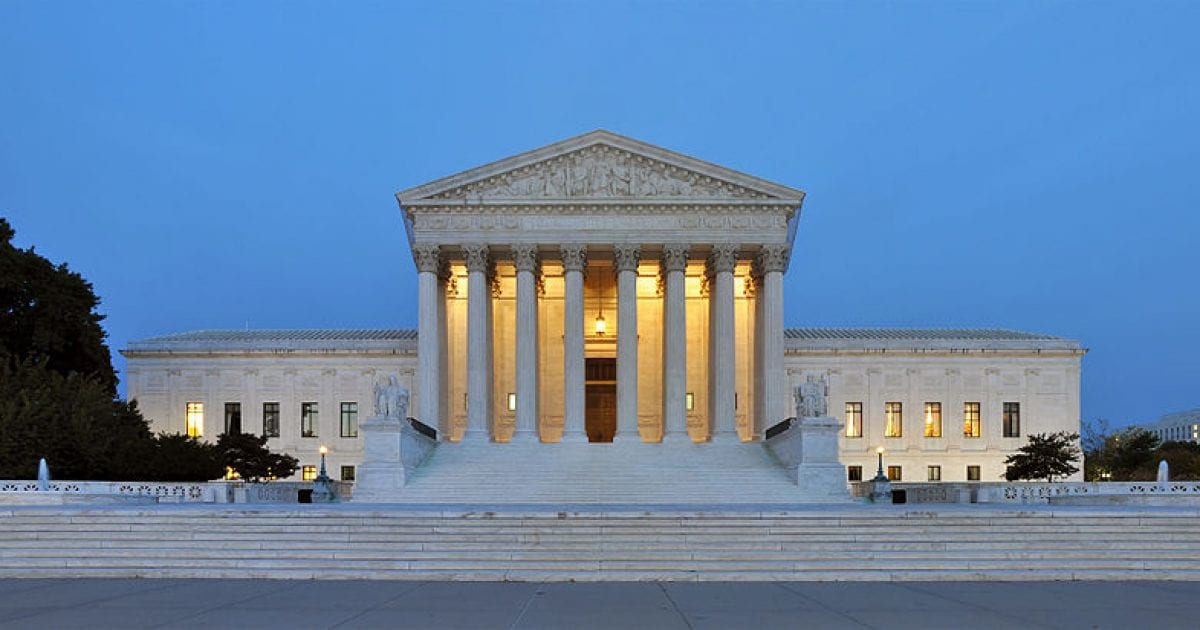Trump is making more and more progress on his vow to crack down on illegal immigration in our country!
The Supreme Court ruled on Tuesday that federal authorities could detain illegal immigrants who had committed crimes any time after their release from prison – a huge victory for the Trump administration.
The ruling was made against a case that argued criminal immigrants should get a hearing to argue to be released unless they were detained immediately from prison.
Check out the story:
Fox News reported on the story:
The ruling that federal immigration authorities can detain immigrants awaiting deportation anytime after they have been released from prison on criminal charges represents a victory for President Trump.
In the case before the justices, a group of mostly green card holders argued that unless immigrants were picked up immediately after finishing their prison sentence, they should get a hearing to argue for their release while deportation proceedings go forward. But in the 5-4 decision on Tuesday, the Supreme Court ruled against them, deciding that federal immigration officials can detain noncitizens at any time after their release from local or state custody. The court also ruled the government maintains broad discretion to decide who would represent a danger to the community in deciding who to release or detain.
During oral arguments in October the Trump administration argued that given the limited money and manpower available, it was nearly impossible for the federal government to immediately detain every immigrant upon their release from custody.
Associate Justice Samuel Alito wrote the majority opinion, stating that "neither the statute's text nor its structure" supported the immigrants' argument. The court's conservative justices sided with the Trump administration, which argued as the Obama administration did, against hearings for those convicted of crimes and affected by the law.
The Los Angeles Times gave more information on the ruling:
The justices, by a 5-4 vote, agreed that Congress authorized mandatory detention of noncitizens who were subject to deportation because they had committed crimes ranging from violent felonies to drug possession. And they may be taken into custody by immigration agents long after they are released from state or local custody, the court said.
The ruling in Nielsen vs. Preap is based on an interpretation of a 1996 law, but it takes on added significance because the Trump administration has been more aggressive in arresting and jailing legal immigrants with crimes on their records.
Justice Samuel A. Alito Jr., speaking for the court’s conservatives, said Congress believed it would be “too risky” to allow dangerous criminals and terrorists to remain free on bail while their deportations were pending. But he went on to describe the law as requiring mandatory detention for noncitizens who had committed crimes “including, for example, any drug offense by an adult punishable by more than one year of imprisonment as well as a variety of tax offenses.” He was joined by Chief Justice John G. Roberts Jr. and Justices Clarence Thomas, Neil M. Gorsuch and Brett M. Kavanaugh.
Justice Stephen G. Breyer, speaking for the four liberals, read his dissent in the courtroom. “The greater importance of the case lies in the power that the majority’s interpretation grants to the government. It is a power to detain persons who committed a minor crime many years before,” he said. “And it is a power to hold those persons, perhaps for many months, without any opportunity to obtain bail.”
He said the Constitution gave all people the right to a hearing if they were held by the government. “I would have thought that Congress intended to adhere to these values and did not intend to allow the government to apprehend persons years after their release from prison and hold them indefinitely without a bail hearing,” Breyer said.
Lawyers for the American Civil Liberties Union had brought a class-action suit in California on behalf of lawful immigrants who faced mandatory detention long after they had been released for relatively minor crimes.
Eduardo Padilla, one of the named plaintiffs, came to the United States in 1966 as an infant and became a lawful permanent resident in the Sacramento area. He has five children and six grandchildren, all of whom are U.S. citizens. Padilla had two convictions for drug possession, in 1997 and 1999, and served 90 days in jail in 2002 for having an unloaded pistol in a shed.
In 2013, federal agents arrested him for those past crimes and held him for deportation. But he went free after the 9th Circuit Court of Appeals ruled the “mandatory detention” provision did not apply to immigrants such as Padilla. He was released on a $1,500 bond because a judge decided he did not present a danger and was not likely to flee.
The lead plaintiff in the case, Mony Preap, had come from Cambodia as a child and been a lawful resident since 1981. He was taken into custody for two convictions for possessing marijuana in 2006, but an immigration judge later canceled his deportation and he was released.
ACLU Deputy Legal Director Cecillia Wang, who argued the case, criticized the ruling. “For two terms in a row now, the Supreme Court has endorsed the most extreme interpretation of immigration detention statutes,” she said, “allowing mass incarceration of people without any hearing, simply because they are defending themselves against a deportation charge. We will continue to fight the gross overuse of detention in the immigration system.”
Tuesday’s decision overturns a ruling of the 9th Circuit Courtthat had extended bail hearings and possible release to immigrants who had served time for their crimes and were living and working in their communities.



Join the conversation!
Please share your thoughts about this article below. We value your opinions, and would love to see you add to the discussion!